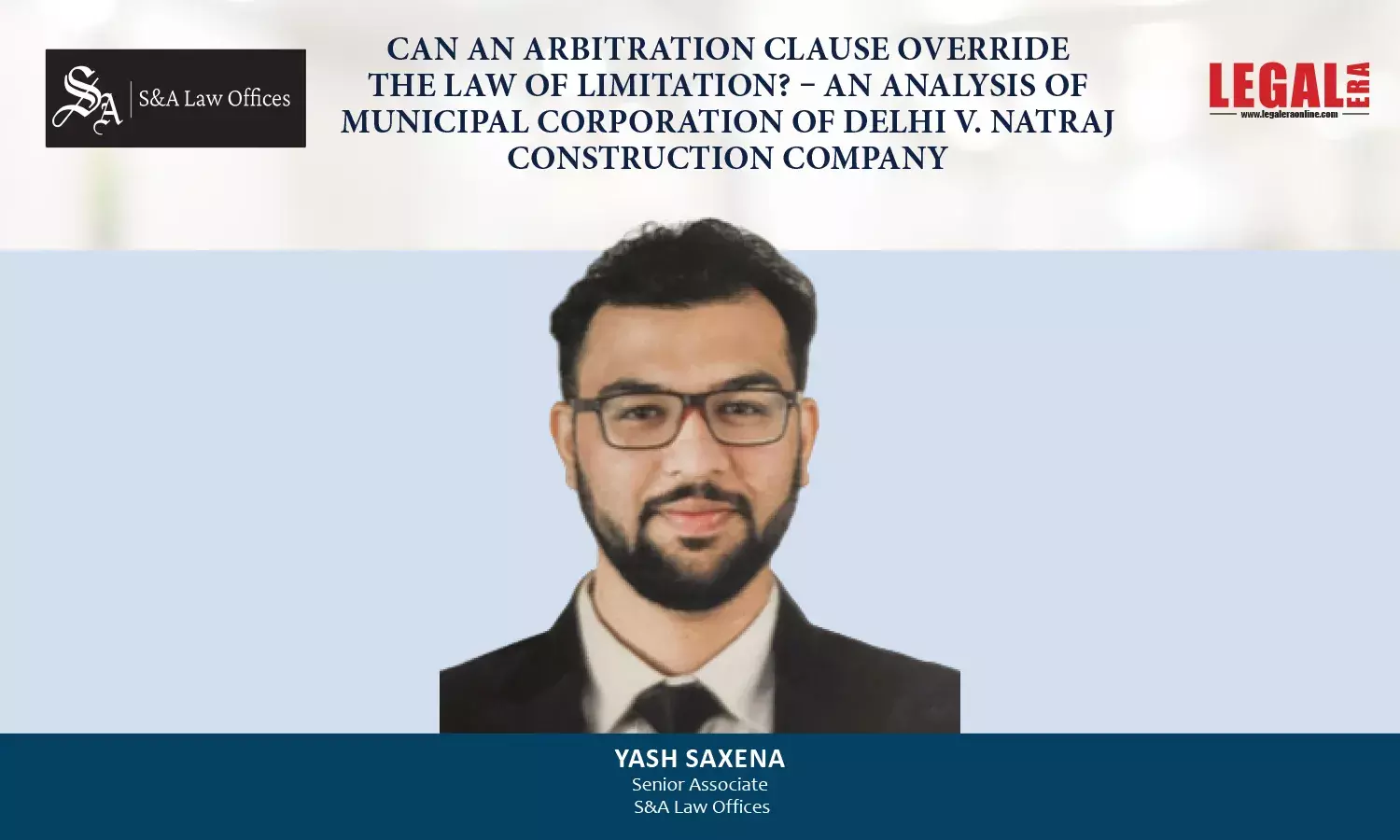Can An Arbitration Clause Override The Law Of Limitation? – An Analysis Of Municipal Corporation Of Delhi V. Natraj Construction Company

Can An Arbitration Clause Override The Law Of Limitation? – An Analysis Of Municipal Corporation Of Delhi V. Natraj Construction Company
Introduction
The settled position of law is that parties cannot contractually limit the time within which arbitration can be initiated, which is dictated by the provisions of The Limitation Act, 1963. A seminal judgment in this regard is that of the Hon’ble Delhi High Court in Municipal Corporation of Delhi vs. Natraj Construction Company,1 which shall be analysed in this article. Section 28 of the Indian Contract Act, 1872 (“ICA”) and its 1997 amendment lies at the heart of this discussion.
Section 28 of the Indian Contract Act, 1872
Prior to its amendment in 1997, Section 28 of the ICA voided agreements which restricted the limitation period for bringing a claim to a period lesser than what was provided in The Limitation Act, 1963. It did not provide anything in respect of agreements which extinguished the right of a party to bring claims on expiry of the contractually prescribed period of time. This led to the courts distinguishing between agreements which limited the time within which remedies could be availed and agreements which did away with the right altogether if claims were not raised within the time prescribed by the contract in question. Agreements resembling the former were voided whereas those resembling the latter were held to be valid and enforceable.2 This mischief was legislatively corrected through the 1997 amendment to the ICA which inserted sub-clause (b) in Section 28 thereby voiding those agreements which provided for forfeiture or waiver of the right itself to bring a claim if no action was commenced within the period stipulated by that agreement.
Facts of Municipal Corporation of Delhi v. Natraj Construction Company
The dispute arose out of a contract/work order dated 09.03.2004 for providing and fixing Retro-Reflective Sign Board on Maharshi Parshuram Marg, Delhi awarded by the Municipal Corporation of Delhi (“Employer” / “Appellant”) to Natraj Construction Company (“Contractor” / “Respondent”). The time for completion of the work was three months. The Respondent completed the work on 22.05.2004 i.e., within the contractually stipulated time and raised a bill for Rs. 2,93,857/- upon the Appellant for the work done. The Appellant refused to make any payment on the ground that the Central Bureau of Investigation (“CBI”) had registered an FIR with respect to the sub-standard quality of work done in cases relating to fixation of Retro-Reflective Sign Board, and the officials of the Appellant as well as the Respondent were named as accused persons therein. This led to the Respondent initiating arbitration against the Appellant which culminated in an award dated 06.11.2009 in favour of the Respondent. The arbitrator awarded the Respondent the entire amount claimed for work done i.e., Rs. 2,93,857/- and Rs. 7,750/- as refund of earnest money deposited along with interest at 15% p.a. from 01.05.2007 till the date of the award, as well as the costs of arbitration. The Appellant filed a petition under Section 34 of the Arbitration and Conciliation Act, 1996 (“ACA, 1996”) before the Ld. ADJ-04, North District, Delhi challenging the award. By Order dated 01.05.2010 (“Impugned Order”), the Ld. ADJ-04 dismissed the set-aside petition and upheld the award. This led to the Appellant filing the present appeal under Section 37 of the ACA, 1996 against the Impugned Order.

Objections Regarding the Claims being Time Barred
The main argument of the Counsel for the Appellant was that Clause 25 of the contract stipulated that any challenge was required to be raised by the Respondent within 120 days of 30.11.2004, whereas the Respondent initiated arbitration much later. Thus, its claims were time barred. Reliance in this regard was placed on the judgment of the Hon’ble Supreme Court in National Insurance Co. Ltd. v. Sujir Ganesh Nayak & Co. and Another.3
Decision by the Hon’ble Delhi High Court and Reasoning Therefor
The Court inter alia rejected the Appellant’s argument regarding the claims being barred by limitation and dismissed the appeal. In doing so, the Court cited and discussed other judicial precedents wherein a similar argument regarding the claims being time barred was raised and rejected. The Court first discussed its decision in Pandit Construction Company v. Delhi Development Authority & Anr.4 where a similar argument regarding the claims being time barred was raised and rejected. In that case, payment related disputes had arisen out of a contract for construction of a shopping centre in New Rajinder Nagar, Delhi which were referred to arbitration. The contract therein contained a stipulation that if the contractor did not initiate arbitration within 90 days of receiving intimation from the Engineer-in-Charge that the bill is ready for payment, its right to a remedy would be deemed to be waived and absolutely barred. The arbitrator therein rejected the claims of the contractor holding them to be barred by limitation in view of the contractual stipulation. The contractor then challenged the award leading to the present decision. The court rejected the argument of the Respondent therein that the claims were time barred and set aside the award.
Ratio of Pandit Construction Company v. Delhi Development Authority & Anr.
The Court noted that the 1997 amendment to Section 28 of the ICA sought to obliterate the distinction arising from the provisions of the earlier Section 28 as it stood unamended in respect of the extinguishment of a right of any party on expiry of a specified period, by voiding such agreements. It distinguished the judgment of the Hon’ble Supreme Court in National Insurance Co.5 on the ground that, even though it was rendered on 21.03.1997, there was no discussion therein regarding the effect of Section 28(b) which had come into force on 08.01.1997.6 Rather, the Apex Court had distinguished between agreements curtailing the period of limitation and agreements providing for forfeiture/waiver of the right if no action was commenced within the contractually stipulated period of time, holding the former to be void and latter to be valid. Further, the Court also distinguished another of its own decision namely Continental Construction Ltd. v. Food Corporation of India and Ors.7 which was relied upon by the Counsel for the Respondent therein. The Court held that unlike in that case where the contract was signed and executed before the 1997 amendment, the present contract was executed after the amendment came into force, thus making Section 28(b) applicable to the case. The Court also cited three of its decisions namely Hindustan Construction Corporation v. Delhi Development Authority & Anr.,8 J.K. Anand v. Delhi Development Authority and Anr.9, and Union of India v. Simplex Concrete Piles India (P) Ltd.10 where it had taken a different stand in view of the provisions of Section 28(b) of the ICA. In J.K. Anand,11 it was held that the contractual clause therein, which forfeited the right of the contractor to initiate arbitration upon expiry of 90 days from the date of intimation of the final bill being ready for payment, deprived the contractor of a very valuable right, and could not be upheld in view of the provisions of Section 28(b) of the said Act. However, the Counsel for the Respondent aired his grievance that none of the aforesaid three cases discussed the National Insurance Co.12 decision of the Hon’ble Supreme Court. This led to the Court citing another of its own decision namely Explore Computers Pvt. Ltd. v. CALS Ltd. and Anr.13 where both the effect of the amendment of Section 28 of ICA and the judgment National Insurance Co.14 were discussed. It noted that the unamended Section 28 applied to the facts of the National Insurance Co.15 case as that was the applicable law when the cause of action therein arose, whereas the cause of action in the present case arose after the 1997 amendment came into force i.e., after 08.01.1997. It was clarified that the 1997 amendment has widened the scope of Section 28 whereby Clause (a) deals with the pre-amendment position alone and Clause (b) is in addition. Consequently, after the coming into force of the 1997 amendment, the distinction sought to be carved out earlier by the legal pronouncements would not hold good.16 It was thus held that a judgement has to take into account the effect of Section 28(b) of the ICA if the cause of action arose after 08.01.1997.
Provision of The Limitation Act, 1963 versus Contractually Stipulated Shorter Time Limits
The Court also discussed its decision in M/s Smart Commodity Broker Pvt. Ltd. v. Beant Singh17 wherein it was held that in view of the amended Section 28 of the ICA, it was the larger period of 3 years as per Article 137 of The Limitation Act, 1963 which would be applicable for seeking reference to arbitration and not a period lesser than that (as was provided by Bye-Law 15.11 of the Rules of the Multi Commodity Exchange of India Limited in that case). The Court also discussed therein its decision in Biba Sethi v. Dyna Securities Ltd.18 wherein a similar provision namely Byelaw 3 of Chapter XI of the National Stock Exchange of India Byelaws was under discussion, and it was held that the period of limitation of six months for initiating arbitration as prescribed therein, would be in the teeth of Section 28 of the ICA and thus void to that extent.
A Parting Caveat: Perils of the Prospective Effect of a Substantive Amendment
As is clear from the discussion above, in view of Section 28(b) of the ICA and the cases analysed, parties cannot override the law of limitation and agree upon a shorter limitation period for the purpose of initiating arbitration. It must however be kept in mind that, since the law as it stands today derives legislative sanction from Section 28(b) of the ICA, parties would not be able to take advantage of the 1997 amendment to the ICA if the cause of action for initiating the arbitration arose before the 1997 amendment came into force i.e., before 08.01.1997.
Disclaimer: This article was first published in the S&A Law Offices - 'Indian Legal Impetus' newsletter in August 2024.
2. Supra
3. (1997) 4 SCC 366
4. 2007 SCC OnLine Del 993
5. Supra
6. Supra (Para 16)
7. 2002 SCC OnLine Del 4
8. 2002 SCC OnLine Del 621
9. 2001 SCC OnLine Del 535
10. 2003 SCC OnLine Del 1127
11. Supra
12. Supra
13. 2006 SCC OnLine Del 701
14. Supra
15. Supra
16. Supra (Para 54)
17. 2017 SCC OnLine Del 10591
18. 2009 SCC OnLine Del 526

